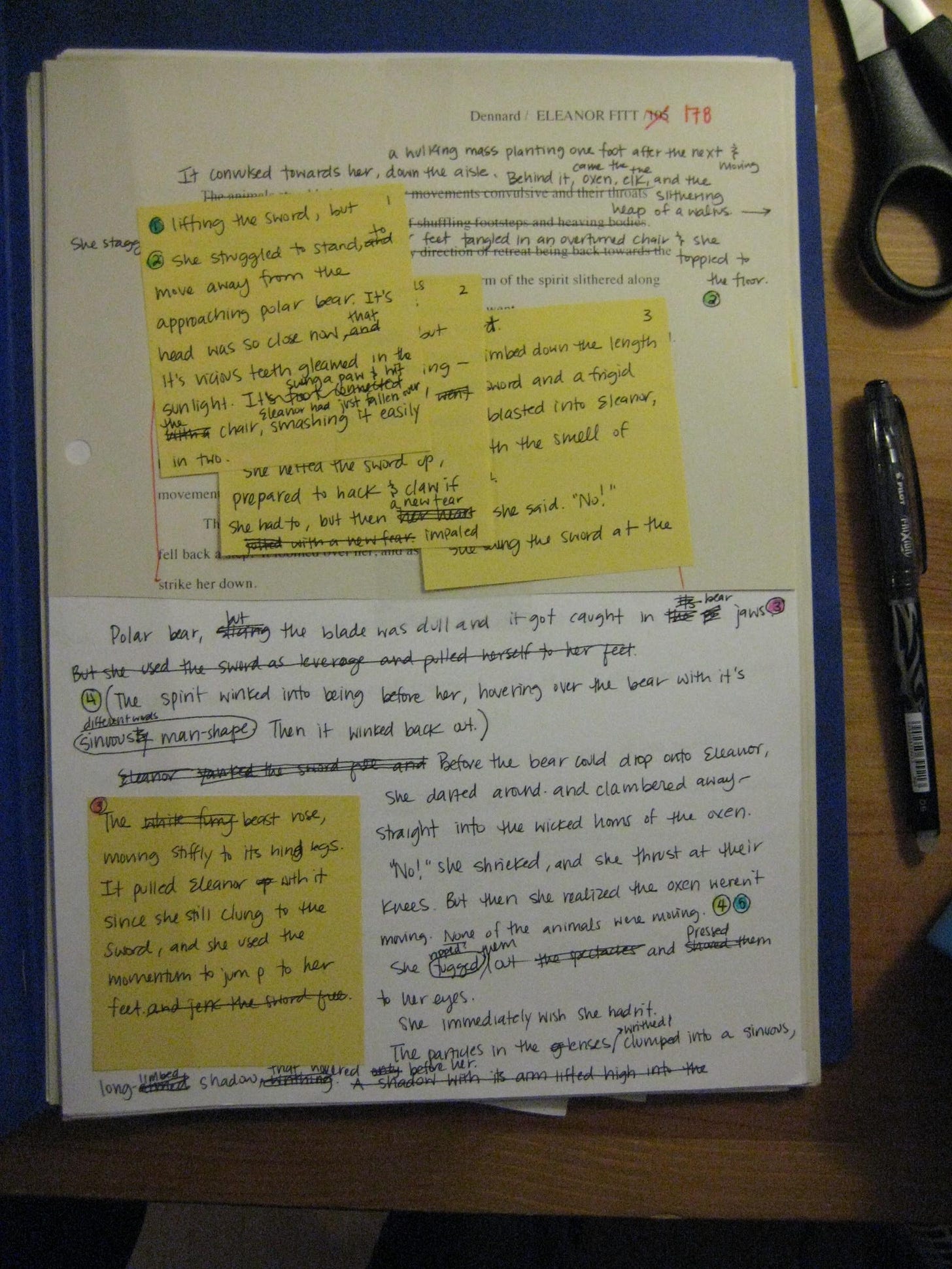1. Dragon Age: The Veilguard
WHO ELSE IS FREAKING OUT OVER THE NEW DRAGON AGE STUFF?! I mean….I MEAN!!! We’ve only been waiting a decade for this.
Yes, I realize this game is set to be less open world, more Mass Effect 2 with missions and a hub than previous installments, but is that necessarily a bad thing? Let’s be real: most of us are here for the story (and the romance). Sure, I love a crunchy, mechanically challenging (and ultimately rewarding) combat system—I’m replaying Divinity: Original Sin 2 right now for this exact reason—but I think we all know BioWare’s main strength has always been the narrative and the characters.
What do my fellow DA nerds think?
And in case you missed the gameplay reveal, here it is (VARRIC!!!!):
2. Audio Newsletters
I’m glad so many of you enjoyed the audio newsletter from last week! I will definitely do more of those in the future. I found it easy and fun—which will surprise absolutely no one who saw me on tour last week! I am a Chatty Cathy to the extreme.
As for how I transcribed it—since a number of you asked—I used the Otter app on my phone, then I went through and listened + fixed as many typos as I could quickly-ish catch.
That’s not the most efficient way to do this, but I also hate an error-riddled transcript. I want everyone to get the most out of what I’m producing, and you can’t do that if the transcription AI fails you.
That said: I think I’ll try the Substack built-in transcription next time. If it turns out to be terrible, then I’ll just go back to my other method.
3. Thank you 🇬🇧
Thank you to EVERYONE who came to see me on tour in the UK! It was such an incredible trip. I lost my voice before I left (as you all heard on the audio newsletter!) and did not regain it until two days after tour because I did so much talking for all 9 days I was away.
Which was amazing! I can’t wait to come back next year! 😘
P.S. For readers of my books, there’s another sneak peak of The Whispering Night over on
.4. Revising Under Deadline
Onto this week’s AMA, all about revising under deadlines. 🥰

@Taylor asked:
One question I cannot seem to find the answer to is what are the turnaround time expectations from editors on various types of edits? I am not published but I also see a lot about "talk to your agent about if the deadlines are doable or not for you". Because nobody says what that timeframe looks like, I don't know if I need to cultivate some more speed/skills/adaptations to prepare ahead of time or if general expectations fit into my current process. Thanks again, Sooz! I'm halfway through The Hunting Moon and I can't wait to see what happens.
Hi Taylor! I assume you’ve finished The Hunting Moon by now. 😅 I hope you enjoyed it!
As for your question, it’s hard to answer—and the “talk to your agent about if the deadlines are doable or not for you” is unfortunately the best answer there is. Because you see: it varies wildly.
I’ve gone from having almost no editorial and having to rely on beta reads from anyone I could tap as I was drafting a book—and then turning that version into copyedits, just to keep a book’s release date on time.
And then I’ve been in the situation where I have two months (or more) to get a revised book back to my editor, and then we’ve moved onto multiple editorial rounds after that.
So many factors play into the turnaround time because so many departments are in play with regards to the overall schedule. And these days, thanks to all sorts of supply chain issues, publishers need longer and longer lead times.
In other words, the time between the physical printing of the book and the release date into stores keeps growing. There are simply too many hiccups that keep happening between “finishing the book” to “reaching bookstores” that could be devastating if they happen close to release.1
That said: if a turnaround time on any deadline is ever too short, then you need to alert your agent. Then your agent will step in to: 1) wring more time out of the current production schedule, if there is any to be had, or 2) get the book bumped to a new release date. (Which is okay. Trust me: if a book has to be bumped, that is okay.)
Out of curiosity, I did an informal survey of author friends to see what their current turnaround time expectations are on a first round of developmental edits. In case you all don’t know or need a refresher, in traditional publishing, the usual order of editorial events goes:
Developmental edits: These are the big changes! The first round is usually the meatiest, addressing plot, character, emotional resonance, etc. You will typically get the most time here.
Developmental edits, round 2: Anything you missed or perhaps didn’t get quite right in round 1 is now addressed. Plus anything more “micro” like setting or pacing.
Line edits: This is when your prose is polished and pacing really focused on.
Copyedits: This step is now considered “production,” meaning you’re no longer getting notes from your editor, but instead from members of the production team. During copyedits, you will fix grammar issues, sentence-level logic problems, and consistency or continuity errors.
Pass Pages: The typesetter(s) has now created the book for you, filled with all the necessary notations for printing. It’s your last chance to read and make changes—but only small changes! Otherwise, the typesetter will have to redo the entire book, and that is both costly and time-consuming. Typically you will do only one round of pass pages, but it’s also common to move onto Second Pass Pages or even all the way up to Fifth! It just depends on what proofreaders find as they read too.
From my informal survey, as expected, the turnaround time on those first developmental edits are all over the board. Anywhere from two weeks to two and a half months! One friend even just got her first round of dev edits for her first adult novel, and it’s a four month (!) turnaround time.
Four months is definitely a larger turnaround time than I typically hear about—so if you’re learning to edit, I would urge you to focus on learning to edit under pressure.
In fact, I think one of my greatest skillsets as an author is that I can do an entire round of developmental edits in two weeks—even on massive books. Revising is my jam, and I can pull long, long days to get it done. I go into a total flow state with revisions!2
That said, most people would (understandably) balk at a two-week deadline on their first round of edits. Or even a month might be too short—or even two months. If (or when) you find yourself needing more time: talk to your agent and see what they can do for you.
It is totally normal, totally common for writers to ask for more time on their deadlines. In fact, one friend in my informal survey answered me with:
“I will say that I often had to ask for extra time…my editor usually starts low (3-4 weeks) and I usually wind up with something closer to 8.”
As you can see right there: you can get more time, and often there is room in the schedule to provide it.
And if there is no wiggle room in the production schedule, then that’s okay too. Your book will be moved to a new release date; the schedule will get changed; and you can continue editing with that extra time.
I do think cultivating skills, as you put it, Taylor, is a good idea! You’re going to have to learn to not only edit on a timeline, but also to edit based on external feedback. Contrary to what you might think, edit letters aren’t a paint-by-number explanation of how to fix your book. More often, they are a detailed list of what the editor senses isn’t working…and it’s up to you to find the solution.
Or, some editors do offer solutions, but they’re often just ideas to get your own creativity working. It’s highly possible you won’t agree with the editor’s solutions—and in fact, this is also a skill: learning when you agree with the editor and when you don’t.
One thing I’ve discovered over my many years doing this is that often what the editor says is broken isn’t what’s actually broken. Oh, they’re sensing a genuine issue in the text, but they won’t always pinpoint what that issue is.
For example: maybe they think pacing is slow. But the solution isn’t necessarily to “add more action” or “cut more words.” Instead, the issue might be rooted in character—the protagonist’s desperate desire isn’t propulsive enough or their stake in the conflict isn’t personal enough.
Learning to spot issues in your manuscript is one of the best skills you can ever acquire. Or, even if you never get good at spotting issues without help (totally valid!), then learning how to apply criticisms and edit your manuscript will transform both your comfort in this business and the quality of what you produce.
Just as writing is a learned skill with neural pathways we prime through practice, so is revising. I offer this free course on how to revise your novel here, and of course, I always urge writers to work with other writers and hone their skills through critiquing.
I hope this helps Taylor! Feel free to let me know if it doesn’t, and I can tackle the question again.
💚 - Sooz
Remember when that boat sank filled with books? Yeah! As I’m sure you can imagine, that would really disrupt a release date! 🚢
Don’t feel bad if this isn’t you! It takes all types, and revising just happens to be a skill I am both naturally inclined toward and have honed with years of practice.




I need to finish a few of my DAI playthroughs now that the next one is finally announced! It's so awesome, I can't wait.
I’ve been losing my mind ever since that gameplay omg. The art style will take me some time to get used to (I prefer more realism), and I generally prefer more open worlds (still hoping there’ll be lots to explore?) but it looks absolutely stunning and I’m so, so very excited.
Also the fact that the official dragon age account said we’ll be able to remake our Inquisitor at the beginning alongside our new protagonist?! Had me screeching. Gives me hope for that Lavellan/Solas reunion I’ve been dreaming of for years now. 😭